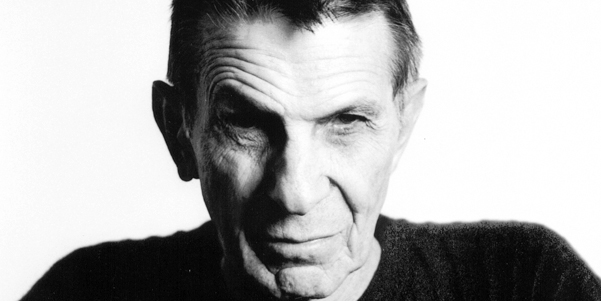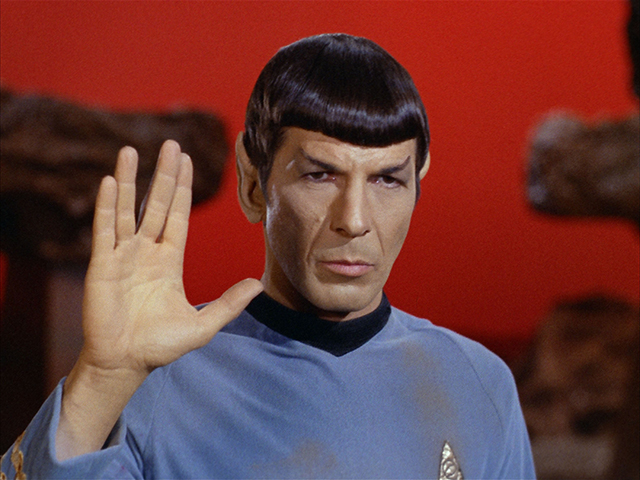Welcome back to Channel Chaser. You may have noted the lack of my customary, cheerful exclamation point after that first sentence and figured already that I’m bearing some bad news. Well, you’d be right. The truth is that I don’t feel all that happy this week, and there’s a reason why that is: the unfortunate and untimely death of one of my favorite actors in Hollywood.
As you’ve probably already guessed, I’m talking about Leonard Nimoy. Nimoy was a well-known star, beloved by many, and known of a variety of roles he played on television and in film across the decades, from the Machiavellian scientist William Bell on Fox’s X-Files-inspired mystery show Fringe to the voice of the traitorous Autobot leader Sentinel Prime in the third Transformers film. But many people probably know him best by another name, and one that’s not even from this world: Spock.
Usually when an actor from a show I’ve seen or liked passes away, I feel a bit sad, but it doesn’t affect me too much because I, of course, never knew them personally or outside their work. But this one was different. Not that I was good buddies with Leonard Nimoy or anything: I can only wish this were the case. But he’s been one of my very favorite celebrities for so long and I’ve followed his career and public life so intensely that I just feel a bit closer to this than most. The fact that his most iconic role was also a huge influence in my life just adds more weight.
When I was young and growing up, just learning that television was about the greatest thing ever created by man, one of the first shows my parents introduced me to was Star Trek. Of course, being born in the 90s at that point, most of the stuff on TV was the highly-regarded franchise spin-off Star Trek: The Next Generation. The more dated and relatively campy first outing was confined specifically to the Sci-Fi Channel (yes, back when it was still a decent home for science fiction programming). But the very first thing that pops into my mind when I think of my introduction to The Original Series was my parents telling me to watch for “that guy with the pointy ears.” This was how I met Spock.
One of the reasons I have grown to love and appreciate the original 60’s Star Trek series more than any of the other entries in the franchise is because I loved the basic idea that it sprang from: not only a desire to make sci-fi television on the map as a mainstream item (which, in retrospect, was an unqualified success), but that Star Trek’s creator Gene Roddenberry used the setting of a spaceship crew exploring the galaxy and a United Federation of Planets as a metaphor to try and get the rest of us real-life Earthlings to wise up about our own problems.
While the later Star Trek shows mostly get tied up in techno-babble and plotlines designed to show off futuristic toys, the original series was less about flash and more about substance, using the perspectives and background of each character to deliver a gut-punching moral lesson to the audience. It covered everything: race, religion, war and peace, historical revisionism, and countless other controversial subjects and pointed out how well things could work out if people just accepted each other’s differences and decided to be nice to each other for a change. The bridge of the starship Enterprise was meant to be a sort of United Nations in itself: Africans, Russians, Asians, Americans, Europeans, doctors, soldiers, scientists…all working in perfect harmony despite their contemporary cultural differences.
But out of all this, I was especially drawn to Spock. Why? Because among this diverse group of people, he was still the ultimate outsider: a main character who was not even a human being. Sure, he looked relatively human outside of those bushy eyebrows and pointed ears, but unlike his emotional human comrades, logic was his guiding force. He always approached a problem from the most academic and calculating point of view–a fact that more than once aroused the anger and misunderstanding of his good friends Captain Kirk and Dr. McCoy. His judgments, while always sound, sometimes seemed heartless or even cruel. How could an audience empathize with a character who, essentially, had no empathy?
Part of this was handled by good writing. Episodes like when Spock is infected by an alien spore and falls in love with a human woman showed that it’s not that Vulcans like Spock don’t have emotions, it’s that they just train from birth not express them or to let their feelings cloud their judgment. And more than once, Spock’s logical and rational solutions were found to be far better than those voiced by his overwrought and narrow-minded human friends.
But most of why Spock became such a memorable and beloved figure, not just for me but for the entire world at large, was due to the creative genius and talent of Nimoy himself. First of all, Spock was half human, and this showed as once in a blue moon, Spock would explode with unexpected emotion far deeper than runs in most humans. In time, he even grew to take on more human traits, such as a touch of humor and a knack for going under the radar without ever actually lying about anything (he preferred the words “implication” or “exaggeration”). Spock may have been logical, but he was far from cold: his methods may have been different, but it was always clear that he wanted to help and do right just as much as anyone. And if there was any positive to his lack of emotion, it was his boundless capacity for forgiveness and understanding, which endeared him to his human shipmates and made him forever a fixture of Star Trek history and a beacon of hope for what interstellar cooperation could look like.
Even more than that, I loved Spock because he showed me a better way to live: patience in the face of intolerance, bravery in the face of danger, and calm in the face of chaos. This alien from Vulcan was, in reality, a compilation of all the best parts of humanity. That’s not to say he didn’t have room to grow: Spock certainly did add many more empathatic traits to his persona in later years that made him a bit less standoffish and aloof. But it was the idea that you didn’t have to let your emotions rule you, and that you should measure your decisions by what does the most good for everyone involved, that I took away and that I have tried to cultivate all of my life.
Sure, there were other aliens on the bridge of the Enterprise in the years to come: more Vulcans, Klingons, and even robots. But by then, even they were mainstream. Spock was the one that started it all: the most alienated (no pun intended) figure who became the symbol of a franchise and one of the most popular cultural icons of all time. Leonard Nimoy taught us all to live long and prosper, and if I can live by that mantra half as well as he did, maybe life won’t turn out so bad after all. Farewell, Mr. Spock. You will be sorely missed.
Channel Chaser is written by Kyle Robertson. You can check out more of his work on his website. Check back every Wednesday for new articles.

